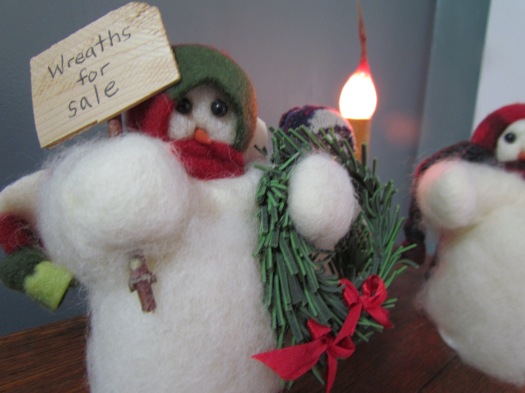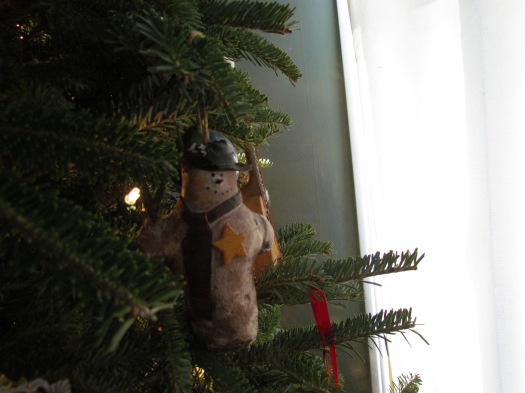
My journal is falling apart. Partly from natural causes (it’s hardcover, and those seem to get hit harder by life), but partly from unnatural causes (Evangeline discovered she can slip her little finger under the spine and I think she’s addicted to the glorious feeling of destruction). I found this particular journal at the bookshop downtown. It’s much larger than I usually use, but I loved that it didn’t have lines. I’d gotten it in my head I could be more creative without lines, that somehow I would begin to channel my artist friends and write in circles, sideways, and doodle in beautiful colors. This of course never happened. All the blank space just invited me to write in various sizes and lean my lines at slants and cause general visual mayhem. It does not look artistic.
My very first journal opens with an entry about learning to ride my bike. I am five years old. I remember the day vividly: my father holding on to the back of the bike, giving instructions, my extreme frustration. Hardly any of this is in the entry, except for a sentence about my dad helping me learn. The other thing that isn’t there?
The fact that my little brother, a mere three-year-old, zoomed past me as I struggled to keep my balance.
He learned how to ride a bike the same day I did. I remember watching him zip along the sidewalk at daring angles, even while I could barely muster the courage to go down the slight hill. My fear of risk showed early, but it didn’t show up in my journal.
I’ve been thinking about the curated life a lot lately. Stay-at-home did many things to me — many things for me — and one of those things is that it made me more attached to my phone, to the internet, and to the world. I started most weekday mornings with NPR while I made my coffee and Evangeline’s breakfast, I moved to Facebook and Instagram when I wasn’t teaching or in a zoom meeting, and I listened to podcasts about the ills of our nation, our world.

Social media grew into something I had never experienced before. Suddenly, what we posted was barometer of our politics and our hearts. What we did not post was a measure of the same. I would hover over a post, wondering if I should like it.
What does it say about me if I like this?
Who will feel supported?
Who will feel ignored?
I got up in my head, thought far too much about how I appeared, and realized there was no way to present my full life — my full self — on a screen. My likes or comments could be misconstrued, and in turn, flatten me into a self that lacked natural human nuance. I started to question the carefully constructed profiles, not as one new to the fact that they exist, but as someone wondering if they are merely a symptom of something greater.

I am always curating my life, whether it’s online, in person, or in my own head.
What I choose to talk about, how I say it, what I highlight, all these things add up to a particular story with a particular slant.
It doesn’t stop when I close the computer or when I put down the cell phone. It doesn’t stop when I finish a telling a story that is factually true but has a twist. And it doesn’t stop when I’m all alone, thinking over my day, or maybe, my life. When I watch short videos I’ve recorded on my phone — moments captured because I knew they would be sweet — I realize how different iPhone recordings are from the camcorder home movies of my childhood: long, tedious vhs tapes with rambling conversations, absent-minded half-hours with the camcorder on the floor while child-feet wander in and out of view. Those home movies are so much closer to life than the ones I’ve been capturing in 15 or 20 seconds. They are not all of an adorable little girl filled with joy. Having my phone at the ready is amazing, and I am so grateful. Yet, it allows me to create multiple “perfect” moments without context. Likewise, my journals are carefully shaped even if it is subconscious, and my own mind seems to be shaped, too. How I tell the story of myself to myself is a strange thing to behold.
So what, you might ask? What does this matter? I am not sure. I know through counseling and the courses I took that the narrative we tell ourselves is important: it crafts our sense of self and what we tell either empowers or degrades us. I also know that what I present of myself online is incomplete, so I can only assume that what others present is incomplete, as well.
None of this is revolutionary, but as I anticipate a winter with less human interaction and more lit-up snippets to swipe past, it feels even more important to remember. People are flesh and blood, with stories and dreams and pain. Journals may brush over them, posts may be beautifully constructed, and even the voice in our heads may have a certain way of hiding the truth, but that doesn’t change the fact that nuance, gray area, and paradox seem to be at the heart of human experience.






















